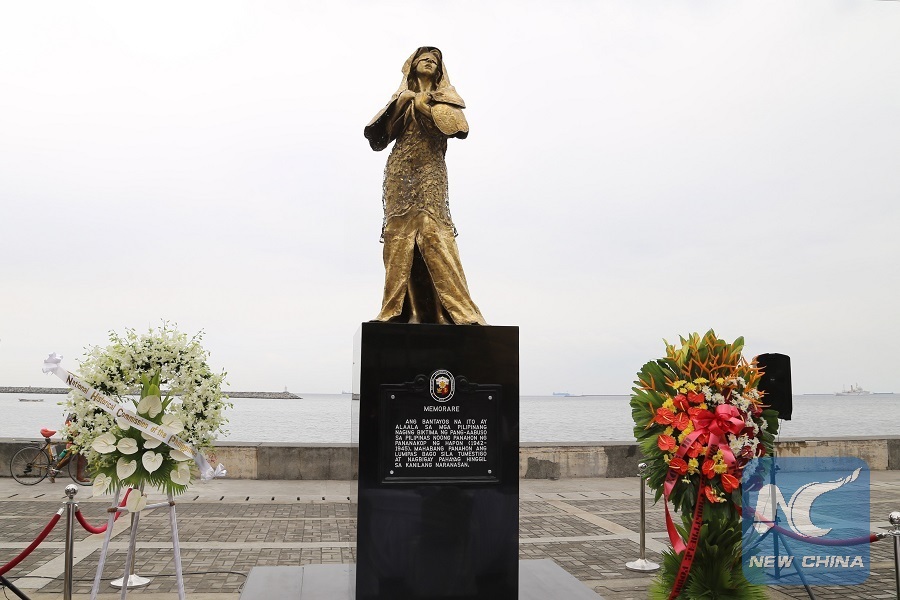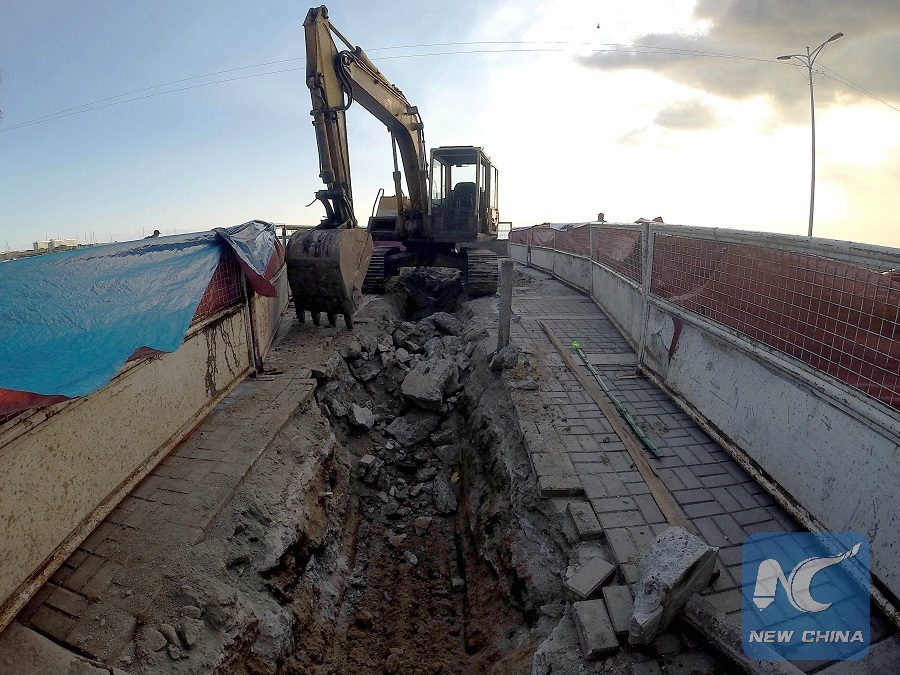
File photo taken on Dec. 8, 2017 shows a statue representing the "comfort women" in Manila, thePhilippines. (Xinhua/Dong Chengwen)
MANILA, May 10 (Xinhua) -- "I felt very sad when I heard that the 'comfort woman' statue was removed. I felt insulted," said Estelita Dy, 88, whose voice was cracking with emotion.
Dy is one of the few surviving Filipino women who were forced to work as sex slave in Japanese military brothels during World War II. She said on Thursday that she was devastated by the decision to remove the statue that depicts their long-standing demand for justice.
The statue was removed on April 27, less than five months after it was erected, on the eve of her 88th birthday. "That's why I was really devastated. I felt I was stabbed in the back again. It was painful," Dy said.

A backhoe is seen at the area where a statue remarking the World War II comfort women used to be in Manila, the Philippines, April 28, 2018. (Xinhua/Rouelle Umali)
At a moment of the press conference, Dy appeared teary-eyed as she denounced the decision to knock down the statue along the famed Roxas Boulevard in Manila City.
The statue, a seven-feet bronze sculpture that depicts a blindfold, grieving woman in Maria Clara traditional Filipiniana gown, was erected in December last year, a few km from the Japanese embassy in Manila.
The unveiling took place 76 years after the Japanese invasion of the Philippines that started on Dec. 8, 1941, 10 hours after the attack on Pearl Harbor. The Japanese imperial forces occupied the Philippines from 1942 to 1945 during World War II.
It's estimated that up to 200,000 women in their teens from around Asia, mainly in South Korea, but also in China, Indonesia and the Philippines, were forced to work in Japanese wartime military brothels during that period.
To keep alive the memories of the "comfort women", similar memorial statues in South Korea, China and the United States have been built.
The erection of the statue in Manila angered Japan. Tokyo protested and demanded that it be taken down.
"Comfort women" is a euphemism for the women, mostly Asians, who were forced to work as sex slaves in Japanese military brothels.
Dy is among the hundreds of Filipino comfort women who publicly admitted in the early 1990s, exposing the sexual abuse they had suffered at the hands of Japanese soldiers during the 1942-1945 Japanese occupation of the Philippines.
Most of these women are in their teens when they were abducted by the Japanese soldiers and brought to a garrison to be repeatedly raped, according to the Lila Pilipina, or the League of Filipino Grandmothers.
Lawmakers from the House of Representatives filed on Thursday a resolution seeking to investigate the removal of the statue.
In filing the resolution, Gabriela Representatives Emmi de Jesus and Arlene Brosas said the removal of the statue "violates existing laws and blackens the memory of abused comfort women who died without even getting a formal apology from the Japanese government for the historical injustice which they suffered."
"We will never allow our dignity and our collective quest for justice to be traded merely for Japanese loans and investments. We will never let this incident be swept under the rug," De Jesus said.
Sharon Silva, the incoming executive director of Lila Pilipina, said the removal of statue "is very much in connection with Japanese aid and loans that the government was negotiating for. But we reiterate our stand there should never be a revision of Philippine history."
Teresita Ang-See of Kaisa Para sa Kaunlaran Inc. said she was told that the statue will never be put back on that same spot in public place, lamenting that the ageing war victims can't be given "a small piece of land, less than 100 square meters."
The Filipino "comfort women" are demanding an official apology from the Japanese government, compensation and inclusion of the "comfort women" issue in Japan's historical accounts and textbooks.
In 2016, the women's party-list filed a House resolution urging the Philippine government to demand a formal apology from Japan for the sexual slavery of thousands of Filipino women by the Japanese Imperial Army during WW II.
In the Philippines, more than 200 women came out open in the 1990s to tell their harrowing experience with the Japanese military. There are only less than 10 of them alive now, mostly in their 80s and sick, according to Dy.

